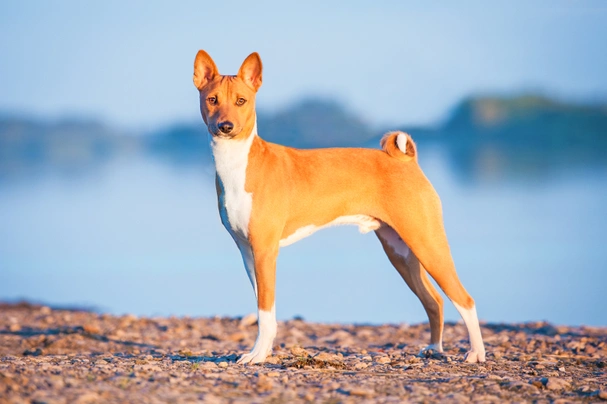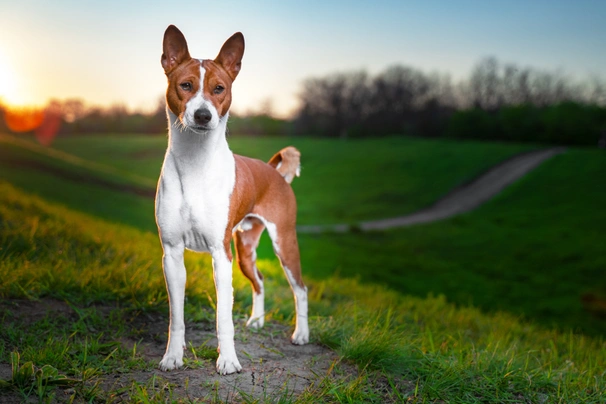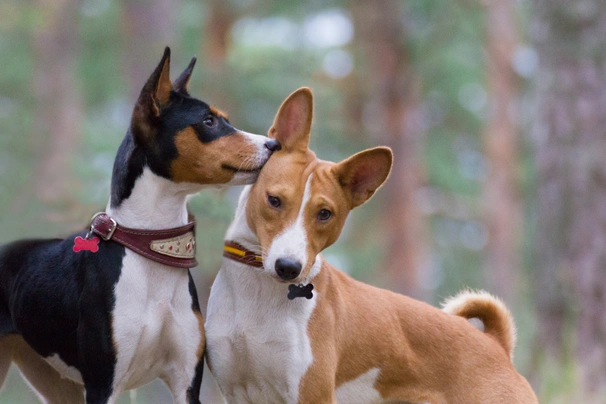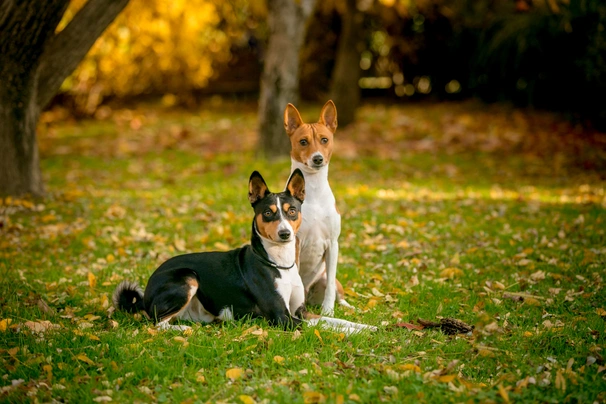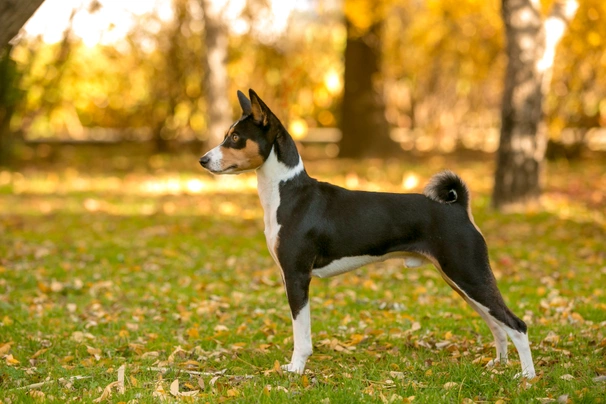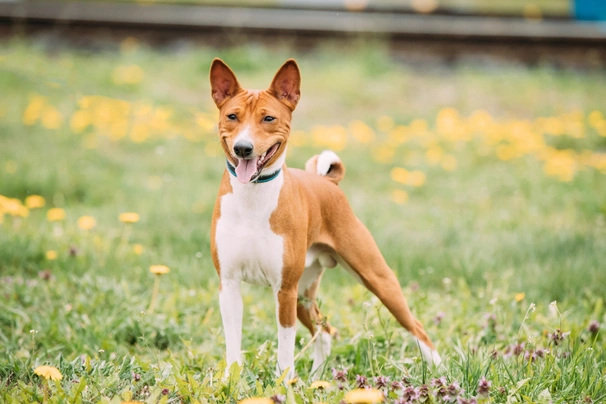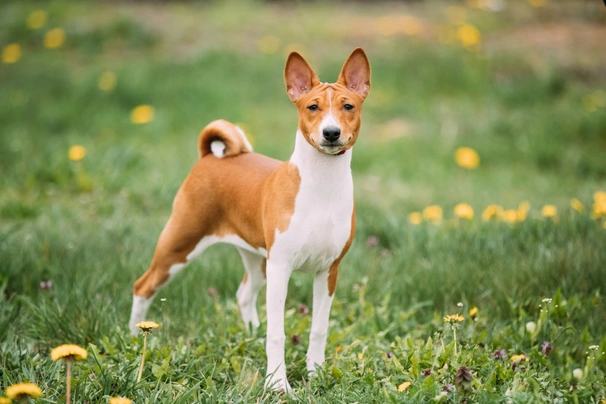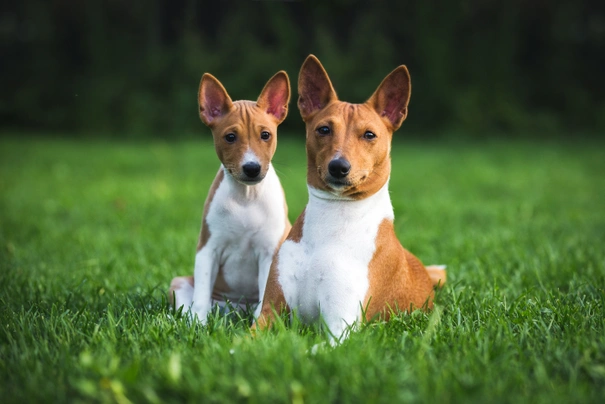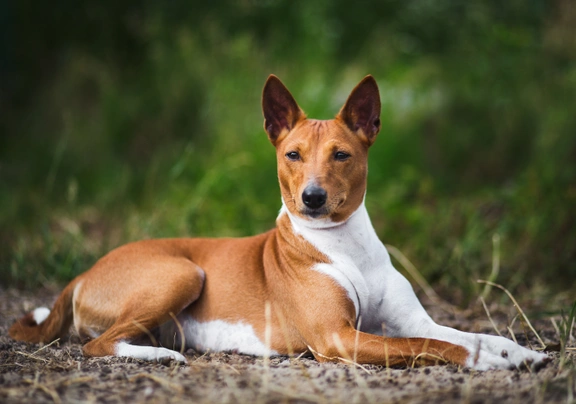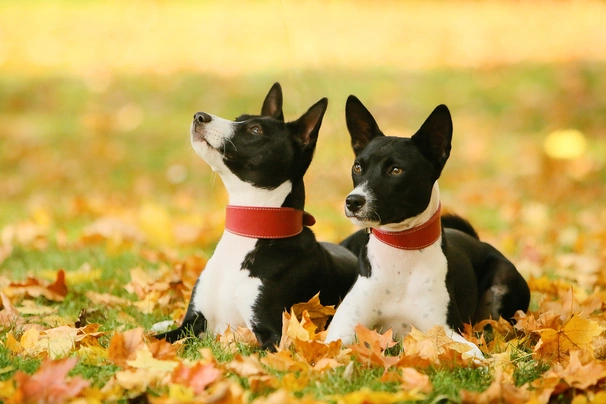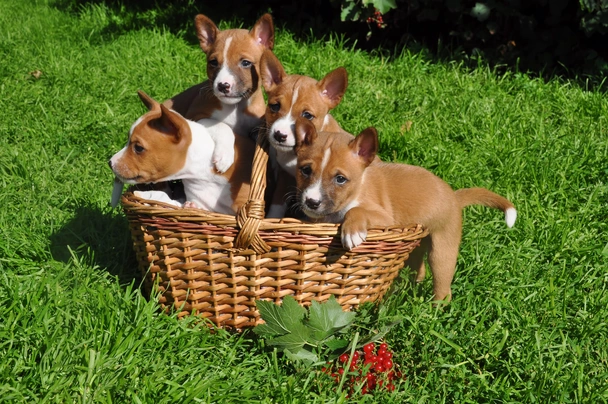Basenji
Pros
Cons
Introduction of the Basenji
The Basenji is often referred to as the "barkless" dog although they are also described as being "talking dogs" because although they don't "bark" like other dogs they make their own unique sound which is more like a yodel that anything else. They are ultra clean dogs which makes them more cat-like than other dogs and they will spend hours cleaning themselves when they have any dirt on their coats. Just like cats Basenjis use their paws to clean themselves and as a result rarely have any sort of smell about them.
Basenjis are around the size of a terrier and have a very endearing look about them which is enhanced by the wrinkles on their foreheads. They are wonderfully friendly by nature as well as being inquisitive and confident. A Basenji forms a very strong and close bond with a family and in particular with one person in a household which is why over the years they have become one of the most popular choices of a family pets or companion dogs.
History of the Basenji
Basenjis have been around for a very long time with evidence of very similar looking dogs being found on wall paintings and engravings in the Pharaoh's tombs of Ancient Egypt. However these extraordinary little dogs were also found in the Congo in the seventeenth century where they highly prized for the hunting and scenting skills. It was in 1682 that an explorer by the name of Merolla found Basenjis when he was travelling in the Congo.
Three dogs that were imported to France from the Belgium Congo can be seen in a picture that was taken in 1880 at the Zoological Gardens in Paris. These dogs bear a striking resemblance to the Basenji and the breed profile that was written back then is very similar to today's breed standard for the Basenji. Over the years these lovely little dogs became highly prized for their hunting skills in many African countries where they are often referred to as "the jumping up and down dog" or M'bwa M'kube M'bwawamwitu.
The first Basenjis to be imported to the UK in 1895 sadly died of distemper after having been shown at Crufts where they were referred to as “African Bush Dogs or Congo Terriers”. After this there were many more attempts at importing Basenjis to the UK but many of the dogs died after having been vaccinated. It was not until the mid-thirties that a lady called Mrs Burns imported a male and two females with all three surviving their time in quarantine. The male was called Bongo of Blean and with his two female companions they were to become the foundation dogs in the UK. The pair produced their first litter in 1936 and the following year in 1937 the puppies were exhibited for the first time at Crufts and the interest was so great that crowds of people had to be kept under control by the Police.
The first Basenji Club in the UK was established in 1939 and following the end of the Second World War breed numbers continued to rise. In 1947 King Farouk of Egypt bought 4 Basenji puppies that had been bred in the UK by Veronica Tudor Williams which were taken back to his Palace in his private plane.
Today the Basenji is still used as a hunting dog in many African countries but these lovely loyal dogs are gaining a big fanbase in the UK and elsewhere in the world too thanks to their sweet personalities and the fact they don't bark. The Basenji also sheds very little and because they are often in the limelight when they appear and win at Crufts being described as the "silent dogs" they continue to be a great choice as family pets and companion dogs.
Interesting facts about the breed
- Is the Basenji a vulnerable breed? No although it can be hard to find well-bred Kennel Club registered puppies in the UK and they can command a lot of money
- Basenjis have a unique voice which includes many sounds that includes yodelling
- They are often referred to as “silent dogs”
- Basenjis are very clean and like to wash themselves much like cats do and therefore have no “body odour” which is why they are such fantastic hunters
- Females only have one season a year which is typically in the autumn
- In Africa Basenjis are called M'bwa M'kube M'bwawamwitu which means the jumping up and down dog
- A German man called George Schweinfurth discovered Basenjis living with the Niam Niam tribe who lived in regions between the Nile and the Congo
- A Basenji called My Lady of the Congo starred in a 1955 film called “Goodbye My Lady”
- A Basenji was Best in Show at Crufts in 2001
Appearance of the Basenji
Height at the withers: Males 41 - 43 cm Females 38 - 40 cm
Average Weight: Males 10 - 12 kg Females 9.5 - 11 kg
Basenjis are quite unique not only in their appearance but in their natures too. They are small to medium in size much like a terrier. They are light and finely boned dogs and they boast a noble look about them. These dogs are always extremely alert and look ready to take off if they spot any prey. They are also very graceful and poised characters that boast a sweet and intelligent look about them with the wrinkles on their brows adding to their overall appeal.
They have nicely proportioned fine and well-chiselled heads and when a Basenji pricks their ears wrinkles appear on their foreheads giving them a quizzical expression that is very endearing. When they are puppies these wrinkles are even more accentuated which is why the Basenji is so adorable looking when they are very young.
Their ears are almond-shaped and slightly hooded which are dark in colour. Dogs hold them upright and well forward on their heads. Their mouths are strong with a perfect bite. Basenjis have very strong and powerful looking necks which are nicely crested and fuller at the base which they hold arched and it's this that gives the Basenji their noble and proud look.
Their forequarters are powerful with well laid-back shoulders and nice long finely boned front legs. A Basenjis body is well proportioned and muscled with a shortish level back over well-sprung ribs. They boast deep briskets that run neatly into a well-defined waist. Hindquarters are powerful and strong looking with long second thighs. Their back legs give the impression that a Basenji is always ready to sprint off after their prey. Their feet and compact neat and narrow with short nails and well arched toes. They carry their tails curled well over their backs whether in a single or double curl.
When it comes to their coat a Basenji boasts a very short sleek and fine coat. The accepted colours for Kennel Club registration are as follows:
- Black & White
- Black Tan & White
- Brindle
- Brindle & White
- Red & White
- Tricolour
Any white colour must be on a dog's feet chest and tips of their tails although some Basenjis have white legs or a white blaze and white collar which is also perfectly acceptable as a breed standard.
It is worth noting that the accepted breed colours for Kennel Club registration can differ from those set out in the breed standard which are as follows:
- Pure black and white
- Red and white
- Black
- Tan and white with tan “melon pips” and dogs have a mask
- Black tan and white
- Brindle – red background and black stripes
Basenjis have white on their feet chests and on the tips of their tails. Legs are white and dogs can have a white blaze and white collar.
Gait/movement
When a Basenji moves they do so by carrying their front legs straight covering a lot of ground with long tireless and swift strides.
Faults
The Kennel Club frowns on any exaggerations or departures from the breed standard and would judge the faults on how much they affect a dog's overall health and wellbeing as well as their ability to perform.
Males should have both testicles fully descended into their scrotums and it is worth noting that a dog can be a little lighter or heavier as well as slightly taller or shorter than set out in the Kennel Club breed standard which is only given as a guideline.
Temperament of the Basenji
Basenjis boast very kind and friendly natures. As previously mentioned their sense of smell and their sight is exceptionally good which is why they are so highly prized for their hunting skills in their native Africa. As pets they retain much of their natural instinct which includes their independent and free-spirited outlook on life.
Basenjis are extremely affectionate dogs although they can be a little stand-offish when introduced to strangers. However once a dog gets to know someone they are friendly and playful around them. Although they are always very affectionate towards the whole family Basenjis tend to form very strong bonds with one particular person in a household and this bond just gets stronger and stronger as time goes on.
When it comes to training a Basenji responds well to gentle yet firm handling. They are very sensitive dogs by nature which means any harsh or rough treatment would not sit well with them. It would be fair to say that a Basenji is not the best choice of pets for first time owners but they make superb companions for people who are used to being around independent thinking dogs and who know how to handle and train them.
A Basenji needs to be kept busy both mentally and physically to be truly happy and well-balanced dogs. If left to their own devices for too long they get extremely bored very quickly and they are known to be extremely good escape artists boasting the ability to jump over high fences and hedges with the greatest of ease. Another thing that many Basenjis do not like is getting wet or being in water which is another very cat-like trait about them.
Are they a good choice for first time owners?
Basenjis are a good choice for first time dog owners providing they have the time to dedicate to an energetic intelligent dog bearing in mind they need a lot of mental stimulation and daily exercise to be truly happy well-rounded dogs.
What about prey drive?
Basenjis have a very high prey drive and will chase anything that moves or tries to run away from them. As such care should always be taken as to where and when a dog can run off the lead more especially if there is livestock or wildlife close by.
What about playfulness?
Basenjis have a very playful side to their natures and love to entertain and be entertained. They are known to be a little mischievous when the mood takes them and being so clever they quickly learn how to open a cupboard door to get at any treats that might be in there and how to get their own way with their silly antics.
What about adaptability?
Basenjis are highly adaptable dogs and providing they are given enough daily physical exercise combined with as much mental stimulation to prevent boredom from setting in. With this said like other dogs they enjoy being able to roam around in a well-fenced secure back garden whenever they can to really let off steam.
What about separation anxiety?
Basenjis form strong ties with their families and dogs are never very happy when they find themselves left on their own for longer periods of time. They tend to bond with one person in a household but are always loyal and devoted to everyone in the family. They are better suited to people who either work from home or in households where one person stays at home when everyone else is out so they are never alone for any length of time which could see a dog suffering from separation anxiety. This can lead to them being destructive around the home which is a dog's way of relieving any stress they are feeling and a way to keep themselves entertained.
What about excessive barking?
Basenjis are not known to be “barkers” and they have a unique voice of their own. With this said they will always let an owner know when they want something which typically involves a bit of “yodelling”.
Do Basenjis like water?
Basenjis are not particularly fond of getting their feet wet although if they are chasing something they will go in the water. With this said owners should never force a dog into the water because it would just end up scaring them. With this said care should always be taken when walking a Basenji off the lead anywhere near more dangerous watercourses just in case a dog decides to leap in and then needs rescuing because they cannot get out of the water on their own.
Are Basenjis good watchdogs?
Basenjis are good watchdogs because they are always on the alert. However rarely would a dog show any sort of aggression preferring to keep their distance and “voice” an opinion to let owners know they are unhappy about something.
Intelligence / Trainability of the Basenji
Basenjis are intelligent but they are high spirited and sometimes a little nervous by nature which can make them harder to train. Their training and socialisation needs to start early always showing a Basenji a lot of understanding and patience. It's also important to bear in mind that these dogs tend to form a very strong bond with one person which makes it easier for that person to educate them.
The Basenji is a sensitive dog by nature and therefore does not respond well at all to any harsh correction or training methods. They do respond to positive reinforcement and with patience they will learn the house rules and how to behave although it would be fair to say that they might not win any prizes in obedience competitions. One thing to bear in mind when training a Basenji puppy is that if they have a bad experience during their education they will not forget it. In short great care must be taken when training a Basenji when they are young.
Like all puppies Basenjis are incredibly cute with their large ears and oversized paws which means it is all too easy to spoil them when they first arrive in their new homes. However once a puppy is nicely settled in owners should start out as they mean to go on which means laying down rules and boundaries which helps puppies understand what is expected of them. It also helps establish a pecking order and who is alpha dog in a household. The first commands a puppy should be taught are as follows:
- Come
- Sit
- Stay
- Heel
- Quiet
- Leave it
- Down
- Bed
Children and other
Basenjis do make wonderful family pets although very young children tend to worry them which means any interaction has to be well supervised by an adult at all times to make sure things stay calm and friendly.
When it comes to other pets and animals Basenjis if well socialised from a young age and introduced to as many new things as possible generally accepts being around them and this includes cats. However it always pays to keep a close eye on things when a Basenji is first introduced to another animal or dog to make sure things stay calm and under control.
Health of the Basenji
The average life expectancy of a Basenji is anything between 12 to 14 years when properly cared for and fed an appropriate good quality well balanced diet to suit their ages.
As a breed the Basenji is known to be a robust and healthy dog. However they are known to suffer from the following disorders which are worth knowing about if you are about to get a Basenji puppy or adopt and older more mature dog:
- Persistent pupillary membrane (PPM) – litter screening available
- Hip dysplasia – dogs should be hip scored by a BVA registered vet or the Animal Health Trust (AHT) with the breed’s mean score being 8.5
- Pyruvate kinase deficiency (PKD) – test available through Laboklin
- Fanconi syndrome – test available through Laboklin
- Progressive retinal atrophy (PRA) – dogs should be eye tested through BVA/KC scheme
- Immunoproliferative enteropathy
- Urolithiasis (linked to Fanconi syndrome)
- Autoimmune hypothyroiditis
- Immune mediated haemolytic anaemia
- Patellar luxation
It is worth noting that the breed average COI for Basenjis currently stands at2.1%.
What about vaccinations?
Basenji puppies would have been given their initial vaccinations before being sold but it is up to their new owners to make sure they have their follow-up shots in a timely manner with the vaccination schedule for puppies being as follows:
- 10 -12 weeks old bearing in mind that a puppy would not have full protection straight away but would be fully protected 2 weeks after they have had their second vaccination
There has been a lot of discussion about the need for dogs to have boosters. As such it's best to talk to a vet before making a final decision on whether a dog should continue to have annual vaccinations which are known as boosters.
What about spaying and neutering?
A lot of vets these days recommend waiting until dogs are slightly older before spaying and neutering them which means they are more mature before undergoing the procedures. As such they advise neutering males and spaying females when they are between the ages of 6 to 9 months old and sometimes even when a dog is 12 months old.
Other vets recommend spaying and neutering dogs when they are 6 months old but never any earlier unless for medical reasons. With this said many breeds are different and it is always advisable to discuss things with a vet and then follow their advice on when a dog should be spayed or neutered.
What about obesity problems?
Like other breeds Basenjis can gain weight after they have been spayed or neutered and it's important to keep an eye on a dog's waistline just in case they do. If a dog starts to put on weight it's important to adjust their daily calorie intake and to up the amount of exercise they are given. Older dogs too are more prone to gaining weight and again it's essential they be fed and exercised accordingly because obesity can shorten a dog's life by several years. The reason being that it puts a lot of extra strain on a dog's internal organs including the heart which could prove fatal.
What about allergies?
Some Basenjis are prone to suffering from allergies and it's important for a dog to see a vet sooner rather than later if one flares up. Allergies can be notoriously hard to clear up and finding the triggers can be challenging. With this said a vet would be able to make a dog with an allergy more comfortable while they try to find out the triggers which could include the following:
- Certain dog foods that contain high levels of grains and other cereal-type fillers
- Airborne pollens
- Dust mites
- Environment
- Flea and tick bites
- Chemicals found in everyday household cleaning products
Participating in health schemes
All responsible Basenji breeders would ensure that their stud dogs are tested for known hereditary and congenital health issues known to affect the breed by using the following schemes:
- Persistent pupillary membrane (PPM) – litter screening available
- Hip dysplasia – dogs should be hip scored by a BVA registered vet or the Animal Health Trust (AHT) with the breed’s mean score being 8.5
- Pyruvate kinase deficiency (PKD) – test available through Laboklin
- Fanconi syndrome – test available through Laboklin
- Progressive retinal atrophy (PRA) – dogs should be eye tested through BVA/KC scheme
What about breed specific breeding restrictions?
Apart from the standard breeding restrictions for all Kennel Club registered breeds there are no other breed specific breeding restrictions in place for the Basenji.
What about Assured Breeder Requirements?
The Kennel Club strongly advises that all breeders use the following test on their stud dogs:
Caring for the Basenji
As with any other breed Basenjis need to be groomed on a regular basis to make sure their coats and skin are kept in top condition. They also need to be given regular daily exercise to ensure they stay fit and healthy. On top of this Basenjis need to be fed good quality food that meets all their nutritional needs throughout their lives.
Caring for a Basenji puppy
Basenji puppies are boisterous and full of life which means it's essential for homes and gardens to be puppy-proofed well in advance of their arrival. A responsible breeder would have well socialised their puppies which always leads to more outgoing confident and friendly dogs right from the word go. With this said any puppy is going to feel vulnerable when they leave their mother and littermates which must be taken into account. The longer a puppy can remain with their mother the better although it should never be for too long either.
It's best to pick a puppy up when people are going to be around for the first week or so which is the time needed for a puppy to settle in. Puppy-proofing the home and garden means putting away any tools and other implements that a boisterous puppy might injure themselves on. Electric wires and cables must be put out of their reach because puppies love chewing on things. Toxic plants should be removed from flowerbeds and the home too.
Puppies need to sleep a lot to grow and develop as they should which means setting up a quiet area that's not too out of the way means they can retreat to it when they want to nap and it's important not to disturb them when they are sleeping. It's also a good idea to keep "playtime" nice and calm inside the house and to have a more active "playtime" outside in the garden which means puppies quickly learn to be less boisterous when they are inside.
The documentation a breeder provides for a puppy must have all the details of their worming date and the product used as well as the information relating to their microchip. It is essential for puppies to be wormed again keeping to a schedule which is as follows:
- Puppies should be wormed at 6 months old
- They need to be wormed again when they are 8 months old
- Puppies should be wormed when they are 10 months old
- They need to be wormed when they are 12 months old
Things you'll need for your puppy
There are certain items that new owners need to already have in the home prior to bringing a new puppy home. It's often a good idea to restrict how much space a puppy plays in more especially when you can't keep an eye on what they get up to bearing in mind that puppies are often quite boisterous which means investing in puppy gates or a large enough playpen that allows a puppy the room to express themselves while keeping them safe too. The items needed are therefore as follows:
- Good quality puppy or baby gates to fit on doors
- A good well-made playpen that's large enough for a puppy to play in so they can really express themselves as puppies like to do
- Lots of well-made toys which must include good quality chews suitable for puppies to gnaw on bearing in mind that a puppy will start teething anything from when they are 3 to 8 months old
- Good quality feed and water bowls which ideally should be ceramic rather than plastic or metal
- A grooming glove
- A slicker brush or soft bristle brush
- Dog specific toothpaste and a toothbrush
- Scissors with rounded ends
- Nail clippers
- Puppy shampoo and conditioner which must be specifically formulated for use on dogs
- A well-made dog collar or harness
- A couple of strong dog leads
- A well-made dog bed that's not too small or too big
- A well-made dog crate for use in the car and in the home that's large enough for a puppy to move around in
- Baby blankets to put in your puppy's crate and in their beds for when they want to nap or go to sleep at night
Keeping the noise down
All puppies are sensitive to noise including Basenji puppies. It's important to keep the noise levels down when a new puppy arrives in the home. TVs and music should not be played too loud which could end up stressing a small puppy out making them withdrawn timid and shy.
Keeping vet appointments
As previously mentioned Basenji puppies would have been given their first vaccinations by the breeders but they must have their follow up shots which is up to their new owners to organise. The vaccination schedule for puppies is as follows:
- 10 -12 weeks old bearing in mind that a puppy would not have full protection straight away but would only be fully protected 2 weeks after they have had their second vaccination
When it comes to boosters it's best to discuss these with a vet because there is a lot of debate about whether a dog really needs them after a certain time. However if a dog ever needed to go into kennels their vaccinations would need to be fully up to date.
What about older Basenjis when they reach their senior years?
Older Basenjis need lots of special care because as they reach their golden years they are more at risk of developing certain health concerns. Physically a dog's muzzle may start to go grey but there will be other noticeable changes too which includes the following:
- Coats become coarser
- A loss of muscle tone
- Basenjis can either become overweight or underweight
- They have reduced strength and stamina
- Older dogs have difficulty regulating their body temperature
- They often develop arthritis
- Immune systems do not work as efficiently as they once did which means dogs are more susceptible to infections
- Older dogs change mentally too which means their response time tends to be slower as such they develop the following:
- They respond less to external stimuli due to impaired vision or hearing
- They tend to be a little pickier about their food
- They have a lower pain threshold
- Become intolerant of any change
- Often an older dog can feel disorientated
Living with a Basenjis in their golden years means taking on a few more responsibilities but these are easily managed and should include looking at their diet the amount of exercise they are given how often their dog beds need changing and keeping an eye on the condition of their teeth.
Older Basenjis need to be fed a good quality diet that meets their needs at this stage of their lives all the while keeping a close eye on a dog's weight. A rough feeding guide for older dogs is as follows bearing in mind they should be fed highly digestible food that does not contain any additives:
- Protein content should be anything from 14 – 21%
- Fat content should be less than 10%
- Fibre content should be less than 4%
- Calcium content should be 0.5 – 0.8%
- Phosphorous content should be 0.4 – 0.7%
- Sodium content should be 0.2 – 0.4%
Older Basenjis don't need to be given the same amount of daily exercise as a younger dog but they still need the right amount of physical activity to maintain muscle tone and to prevent a dog from putting on too much weight. All dogs need access to fresh clean water and this is especially true of older dogs when they reach their golden years because they are more at risk of developing kidney disorders.
Grooming of the Basenji
Because Basenjis boast fine short hair they are not high maintenance dogs in the grooming department. The other thing to bear in mind is that they like to keep themselves very clean and will wash themselves using their paws much in the same way as a cat. With this said a weekly brush will help keep a dog's coat in great condition and it will also keep their skin healthy too. Basenjis are not that fond of water which means bathing them can be a challenge but with this said they should not need to be bathed that often unless really necessary.
Exercise of the Basenji
Basenjis like to be kept busy and therefore need to be given regular exercise on a daily basis and ideally this has to include lots of mental stimulation for them to be truly happy well-rounded characters that are a pleasure to have around. They are a great choice for people who lead active outdoor lives because a Basenji is definitely not a "stay at home dog" nor are they couch potatoes. As such a good brisk walk in the morning and then again in the afternoon are absolutely essential. Two hours daily exercise is the ideal for these active alert dogs to prevent boredom setting in and it should include lots of mental stimulation.
However because the Basenji is an incredibly skilled sighthound letting them off their leads can be problematic unless the area is ultra-safe and there are no animals around for them to chase after. Gardens need to be made extremely secure because the Basenji is more than capable of jumping high fences which as previously mentioned they do with the greatest of ease.
Feeding of the Basenji
Basenjis need to be fed a good quality well-balanced diet that meets all their nutritional needs throughout their lives for them to remain fit and healthy. If you have decided to get a puppy from a breeder they would provide you with a feeding schedule and it's important to stick to it for the first few weeks after bringing a Basenji puppy home. You can change their diet when the time is right but this needs to be done very gradually and carefully over a few weeks to make sure puppies don't suffer any tummy upsets.
It's also important for puppies to be fed at least 3 to 4 times a day to begin with but you can start feeding them the same amount of food twice a day when they are around 4 months old always keeping an eye on things to make sure a young dog can cope with the change in their feeding routine.
Older more mature dogs can be fed twice a day once in the morning and then again in the evening and this needs to be good quality food that contains all the right nutrients vitamins and minerals that dogs need to remain healthy. However some Basenjis can become fussy eaters if given too many treats which is something to bear in mind when you are training a dog and using high value treats.
Feeding guide for a Basenji puppy
Puppies need to be fed a highly nutritious good quality diet for them to develop and grow as they should. As a rough guide a Basenji puppy can be fed the following amounts every day making sure their meals are evenly spread out throughout the day and it's best to feed them 3 or 4 times a day:
- 2 months old - 41 g to 92 g depending on a puppy's build
- 3 months old - 50 g to 119 g depending on a puppy's build
- 4 months old - 53 g to 140 g depending on a puppy's build
- 5 months old - 53 g to 143 g depending on a puppy's build
- 6 months old - 56 g to 143 g depending on a puppy's build
- 7 months old - 45 g to 124 g depending on a puppy's build
- 8 months old - 40 g to 106 g depending on a puppy's build
- 9 months old - 35 g to 89 g depending on a puppy's build
- 10 months old - 32 g to 88 g depending on a puppy’s build
Once a puppy is 12 months old they can be fed adult dog food.
Feeding guide for an adult Basenji
Once fully mature an adult Basenji should be fed a good quality diet to ensure their continued good health. As a rough guide an adult dog can be fed the following amounts every day:
- Dogs weighing 9.5 kg can be fed 95g to 159g depending on activity
- Dogs weighing 10 kg can be fed 135g to 206g depending on activity
- Dogs weighing 11 kg can be fed 145g to 216g depending on activity
- Dogs weighing 12 kg can be fed 155g to 226g depending on activity
Basenji price
If you are looking to buy a Basenji you would need to pay anything from £1000 to over £1500 for a well-bred pedigree puppy.
The cost of insuring a male 3-year-old Basenji in northern England would be £22.65 a month for basic cover but for a lifetime policy this would set you back £42.54 a month (quote as of June 2018). When insurance companies calculate pet insurance they factor in a few things and this includes where you live in the UK and a dog's age and breed.
When it comes to food costs you need to buy the best quality food whether wet or dry to feed your dog making sure it suits the different stages of their lives. This would set you back between £20 - £30 a month. On top of all of this you would need to factor in veterinary costs if you want to share your home with a Basenji which includes their initial vaccinations their boosters the cost of neutering or spaying your dog when the time is right and then their annual health check visits all of which quickly adds up to over a £800 a year.
As a rough guide the average cost to keep and care for a Basenji would be between £60 to £90 a month depending on the level of insurance cover you opt to buy for your dog but this does not include the initial cost of buying a healthy well-bred Kennel Club registered pedigree Basenji puppy.
Buying advice
When visiting and buying any puppy or dog there are many important things to consider and questions to ask of the breeder/seller. You can read our generic puppy/dog advice here which includes making sure you see the puppy with its mother and to verify that the dog has been wormed and microchipped.
Basenjis are finding a big fanbase in the UK but can be hard to find which means that well-bred puppies can often command a lot of money. As such with Basenjis there is specific advice questions and protocols to follow when buying a puppy which are as follows:
- Beware of online scams and how to avoid them. You may see online and other adverts by scammers showing images of beautiful Basenjipuppies for sale at very low prices. However the sellers ask buyers for money up front before agreeing to deliver a puppy to a new home. Potential buyers should never buy a puppy unseen and should never pay a deposit or any other money online to a seller. You should always visit the pet at the sellers home to confirm they are genuine and make a note of their address.
- As previously touched upon Basenjis are finding a big fanbase in the UK but can be hard to find. As such amateur breeders/people breed from a dam far too often so they can make a quick profit without caring for the welfare of the puppies their dam or the breed in general. Under Kennel Club rules a dam can only produce 4 litters and she must be between a certain age to do so. Anyone wishing to buy a Basenji puppy should think very carefully about who they purchase their puppy from and should always ask to see the relevant paperwork pertaining to a puppy's lineage their vaccinations and their microchipping.

Black & White Basenji Female Available
£1,600
Adorable Basenji Puppies For Sale
£1,800
